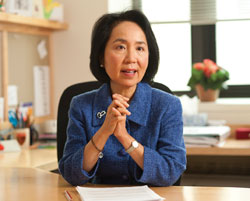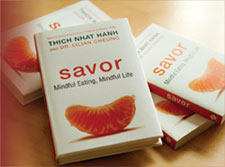Face to Face: An Interview with Dr. Lilian Cheung
Lisa Leslie Henderson writer
Brian Smith photographer
 sa·vor
sa·vor
to enjoy something with unhurried appreciation
What happens when you bring together a Harvard nutritionist and a world renowned Zen Buddhist Master?
A new approach to health and weight loss.
Dr. Lilian Cheung, a Wellesley mom, wife, volunteer, and the director of health promotion and communication at the Harvard School of Public Health’s Department of Nutrition recently collaborated with Vietnamese Buddhist monk Thich Nhat Hanh to write Savor: Mindful Eating, Mindful Life (HarperCollins, 2010). Dr. Cheung has been a student of the Nobel Peace Prize nominated Zen master, who has authored many books including Peace Is Every Step (Bantam Books, 1991) and The Art of Power (HarperCollins, 2007), since 1997. Our interview with Dr. Cheung follows.
Wellesley Weston: There are thousands of books out there about weight loss. What is different about Savor?
Dr. Cheung: It can be confusing to know what to eat as there are myriad conflicting scientific—and not so scientific—theories. What is clear from the rising rates of obesity in the United States and around the globe is that these approaches are not working. Something is missing.
In all my years as a nutritionist, I, too, have focused primarily on the scientific basis of what to eat in terms of edible foods and drinks. Thich Nhat Hanh changed that. Unlike in the West, where we view nutriments as something we eat, Buddhist philosophy describes the nutriments necessary for life more broadly. When I grasped this concept, I had an “Aha” moment; I had found the missing link/clue to attaining healthy weight. In Savor, we take a deeper and broader look at weight management. Our perspective is based on nutritional science and ancient wisdom. We talk not only about what to eat, but more importantly, we talk about how to eat and how to look into the driving forces behind our appetite.
WWM: Over a billion people worldwide are overweight. What, in your opinion, is the reason for this obesity epidemic?
 Dr. Cheung: On an individual level, being overweight is a function of taking in more calories than one is expending, but that is not the whole story. Our society has become toxic in a way that experts call “obesigenic.” Societal forces that drive us to eat more and move less surround us. And the result is weight gain, obesity, and the health and emotional problems that go along with them. Yes, it is ultimately a personal decision to eat more than one needs and to not exercise enough, but it is nearly impossible to escape the pressures around us that lead to unhealthy behaviors.
Dr. Cheung: On an individual level, being overweight is a function of taking in more calories than one is expending, but that is not the whole story. Our society has become toxic in a way that experts call “obesigenic.” Societal forces that drive us to eat more and move less surround us. And the result is weight gain, obesity, and the health and emotional problems that go along with them. Yes, it is ultimately a personal decision to eat more than one needs and to not exercise enough, but it is nearly impossible to escape the pressures around us that lead to unhealthy behaviors.
When we become more mindful of the way we live and eat, we can end the struggle with weight gain. It is beyond knowing what to eat and what not to eat. When we begin to focus on the things that will keep us in balance, healthy, and connected with our inner selves and our place in the world, change happens.
WWM: What do you mean by mindfulness?
Dr. Cheung: Mindfulness is the practice of being fully present in each moment and seeing things as they are, without preconceived notions. Although mindfulness sounds quite mystical and esoteric, people in all walks of life have followed this set of practices on their path to health, well-being, peace, and happiness for over twenty-five hundred years!
 To be mindful of something, we need to be fully present—even for an instant. When we walk and our mind is aware of each step that we take, we are practicing mindfulness. When we eat and our mind is aware of each bite, we are practicing mindfulness. In order to do this, we must first stop our wandering mind in order to engage it more fully in where we are and what we are doing. Often, we find our body is present but the mind is someplace else. Mindfulness practice essentially brings the mind and the body together to enjoy and live in the present moment.
To be mindful of something, we need to be fully present—even for an instant. When we walk and our mind is aware of each step that we take, we are practicing mindfulness. When we eat and our mind is aware of each bite, we are practicing mindfulness. In order to do this, we must first stop our wandering mind in order to engage it more fully in where we are and what we are doing. Often, we find our body is present but the mind is someplace else. Mindfulness practice essentially brings the mind and the body together to enjoy and live in the present moment.
WWM: What is the benefit of cultivating this mindfulness?
 Dr. Cheung: With mindfulness practice, we gain insight into the roots of our overeating. We begin to become more aware of our motivations and the obstacles that get in our way to being healthy. Why do we eat what we eat? How do we eat, and how do we feel after we eat? What attitudes do we have toward physical activity? What are the barriers—physical, psychological, cultural, and environmental—that prevent us from eating well and staying active? As we become more aware of our bodies and the feelings, thoughts, and realities that prevent us from taking health-enhancing actions, we will realize what we need to do and the support we need to achieve a healthy lifestyle and weight.
Dr. Cheung: With mindfulness practice, we gain insight into the roots of our overeating. We begin to become more aware of our motivations and the obstacles that get in our way to being healthy. Why do we eat what we eat? How do we eat, and how do we feel after we eat? What attitudes do we have toward physical activity? What are the barriers—physical, psychological, cultural, and environmental—that prevent us from eating well and staying active? As we become more aware of our bodies and the feelings, thoughts, and realities that prevent us from taking health-enhancing actions, we will realize what we need to do and the support we need to achieve a healthy lifestyle and weight.
This awareness of the present moment also gives us the opportunity and the tools to touch peace and joy, in the midst of our very busy daily lives. Thich Nhat Hanh frequently reminds us that peace and happiness are always in us. We just need to be aware of this and touch them. This peace within ourselves nourishes us in ways that food cannot.
WWM: What does it take for an average person to become more mindful?
Dr. Cheung: Modern living is very hectic; many of us are multi-tasking and feeling overwhelmed and stressed. Very few people have time to add another task to their “to do” list. Mindfulness practice does not have to be another “add-on.” It can be fully and easily integrated into the act of every day living.
Mindfulness is about choosing how to live our lives. It is as simple as taking a few in-breaths and out-breaths here and there throughout the day—while answering e-mail, sitting in traffic, or waiting in line at the grocery store or post office. It is within anyone’s reach. Take small steps every day, and be persistent. These small steps add up. Over time you will feel more alive and more in the flow of life. You will find more stillness amid the chaos.
WWM: Slowing down seems antithetical to modern American life…
Cheung: As a culture we value busyness and productivity. Ironically, by slowing down and being present, we can increase our productivity. This stopping allows us to rest the body and the mind. When we have calmed ourselves, we have many more resources available upon which to draw.
 There is a Zen story about a man and a horse. Imagine that the horse and rider are galloping very quickly—no doubt heading somewhere quite important due to their speed. When a bystander yells out, “Where are you going?” and the rider replies, “I don’t know. Ask the horse!” the true picture is revealed.
There is a Zen story about a man and a horse. Imagine that the horse and rider are galloping very quickly—no doubt heading somewhere quite important due to their speed. When a bystander yells out, “Where are you going?” and the rider replies, “I don’t know. Ask the horse!” the true picture is revealed.
This story is also our life story. Many of us are riding a horse very quickly, but not sure of where we are going. The horse is our “habit energy,” the relentless force of habit that pulls us along, and that we are often unaware of and feel powerless to change. As a result, we are always running. While this may seem valuable, it is actually making us our own worst enemies.
Without rest and awareness we are in conflict with ourselves and often with others. Because we are in this hurried state, when a strong emotion arises within us, we are in great turmoil. We have no peace. Many of us try to pacify this feeling by watching television or eating comfort food, but this doesn’t make the emotional storm go away. It can even make it worse because we often add to the storm by berating ourselves for eating that bag of chips or being a couch potato. Our habit energy creates a vicious, self-defeating cycle.
WWM: So how does mindfulness help us to stop the turmoil in our lives?
Dr. Cheung: We don’t stop it; rather, we accept it. In order to do this, we have to learn to become solid and stable like an oak tree, and not be blown from side to side by the emotional storm. We have to learn the art of stopping—stopping our running so that we can be present for and embrace our habit energies of worry, blame, guilt, and fear, and calm those strong emotions so that they don’t dominate us. Stopping, calming, and resting are preconditions for healing. If we cannot stop, we will continue on the course of destruction caused by unmindful consumption. Consider mindfulness as our ally to help us get out of our own way, change our habits that are counterproductive, and overcome the obstacles and difficulties that can cause us to be overweight.
 WWM: It sounds like a lot of work.
WWM: It sounds like a lot of work.
Dr. Cheung: Being mindful does not mean we are tackling something all the time. In fact, we suggest that the best way to experience mindfulness is to learn and appreciate something that would make you feel good…be happy that you are having a good day, appreciate that you do not have a headache today, be grateful that you can spend an afternoon with your children. Enjoy each breath and know that you are alive and living life at that moment.
Being mindful is to learn to live life peacefully. Learning to grow the seed of happiness or any pleasant feeling is a powerful mindfulness practice that yields strength to face adversity. The bag of chips stays in the cupboard; the storm passes by; we watch, breathing in and breathing out all the while.
WWM: What has it been like to collaborate with Thich Nhat Hanh? How does his practice of mindfulness manifest itself as a co-writer?
Dr. Cheung: It is a rare and precious opportunity to collaborate with Thich Nhat Hanh. He viewed Savor as a good opportunity to combine science with ancient wisdom to solve a modern day problem that is causing major health challenges—if left unchecked, the obesity epidemic will bankrupt our healthcare system—and suffering around the world.
He specifically suggested that we keep the messages simple and straightforward, as I would expect from a Zen master. He also reminded me that writing in itself is a mindfulness practice. He told me that throughout the writing journey, I would encounter many obstacles including my own fear and anxieties that prevent the ideas from flowing. When such circumstances arose, he said, I needed to practice mindfulness to help me overcome my writing block. I remember a time when I was quite stuck and frozen. I followed his advice and just practiced mindful breathing and mindful walking intently for a few days. Then, I noticed that words and ideas start flowing again like a river. ![]()
10 Tips for Mindful Eating for Families
- Reserve a time to share dinner as a family.
- Work together to prepare the meal and set the table.
- Choose foods and drinks that are good for your health and good for the planet. (In general, a plant-based diet is better for your heath and the planet.)
- When you are at the table, turn off the TV and put away the homework and the day’s mail.
- As you sit down, practice conscious breathing a few times to bring your bodies and minds together.
- Refrain from arguing at the table. Let your meals be times of nourishment on many levels.
- As you serve and eat your meal, notice the sounds, colors, smells, and textures and your mind’s reaction to them.
- Eat in moderation by using a small dinner plate, no larger than nine inches across, and fill it only once. Chew thoroughly and eat slowly by putting down your utensils between bites.
- Don’t skip meals because that makes it harder to make mindful choices. When hunger consumes us, the strong forces of “habit energy” may lead us to grab whatever foods are close at hand and those foods often will not further our healthy-eating or weight-loss goals.
- Create an environment that supports healthy eating and active living: Don’t stock sugary drinks at home, remove the television from your children’s bedrooms, limit children’s recreational screen time to no
more than two hours a day, and encourage your children to be active each day for an hour a day.
If you visit www.savorthebook.com, you will find mindfulness forums, recipes, nutrition information, meditations, the insights of Thich Nhat Hahn, and the Savor blog. You can also follow the Savor movement on Twitter (twitter.com/SAVOR_the_book) or on Facebook (www.facebook.com/SAVORthebook) and join the Savor community (community.savorthebook.com). As for nutritional science and facts and healthy recipes, visit Harvard School of Public Health’s nutrition Web site, The Nutrition Source (www.thenutritionsource.org).
© 2011 Elm Bank Media | Beth Furman, Publisher | Beth@ElmBankMedia.com


recent comments